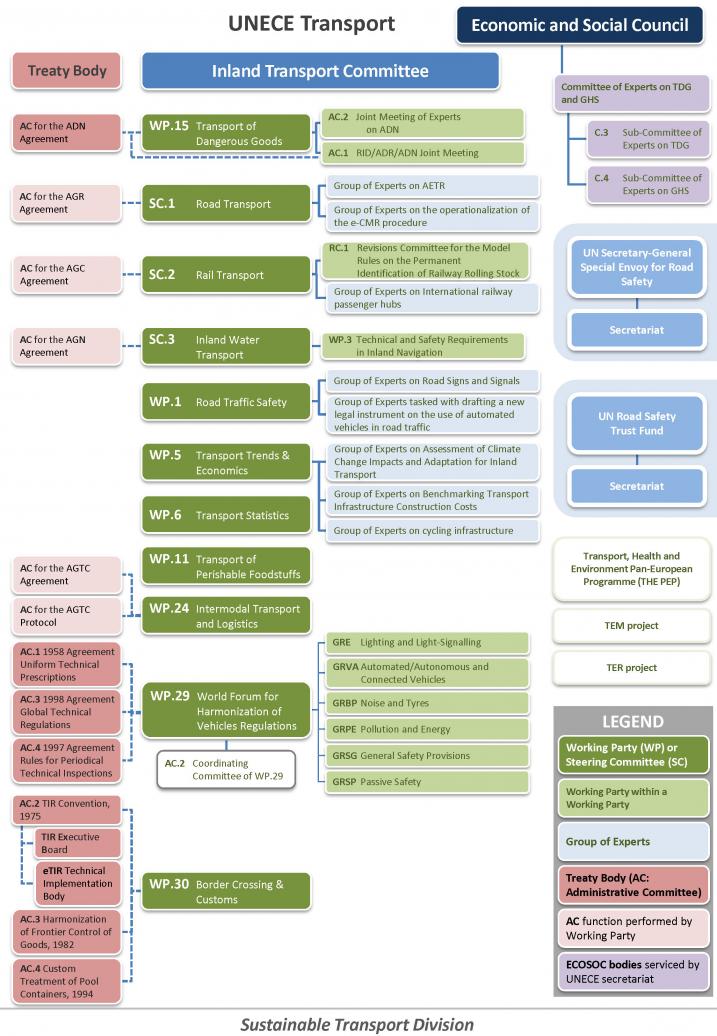Who are we?
The United Nations Economic Commission for Europe (UNECE) is one of five United Nations regional commissions, administered by the Economic and Social Council (ECOSOC). The UNECE Transport works to facilitate the international movement of persons and goods by inland transport modes. It aims to improve competitiveness, safety, energy effciency and security in the transport sector. At the same time, it focuses on reducing the adverse effects of transport activities on the environment and contributing effectively to sustainable development. It is:
How do we work?
The UNECE Transport (click here for the PDF version)
- Centre for multilateral transport standards and agreements in Europe and beyond, e.g. regulations for dangerous goods transport and road vehicle construction at the global level
- Gateway for technical assistance and exchange of best practices
- Promoter of multi-country investment planning
- Substantive partner for transport and trade facilitation initiatives
- Historic centre for transport statistics
How do we work?
- Host the ECOSOC Committee of Experts on the Transport of Dangerous Goods and on the Globally Harmonized System of Classification and Labeling of Chemicals and its subcommittees
- Provide secretariat services to the Inland Transport Committee (ITC) and its subsidiary bodies
- Provide secretariat services to the treaty bodies of the UN legal instruments for inland transport
- Provide secretariat services to THE PEP – the Transport, Health and Environment Pan-European Programme jointly with the Environment Division and WHO Europe
- Host the secretariat of the UN Road Safety Fund
- Host the secretariat of the UN SG’s Special Envoy for Road Safety
- Support the Trans-European Motorway (TEM) Project
- Support the Trans-European Railway (TER) Project
- Give technical assistance to countries in transition
- Undertake analytical work on critical transport issues
- Support the development of infrastructure investments of regional importance
The UNECE Transport (click here for the PDF version)

Sustainable Transport Division Chart

UNECE member States
UNECE has 56 member States: Albania, Andorra, Armenia, Austria, Azerbaijan, Belarus, Belgium, Bosnia and Herzegovina, Bulgaria, Canada, Croatia, Cyprus, Czech Republic, Denmark, Estonia, Finland, France, Georgia, Germany, Greece, Hungary, Iceland, Ireland, Israel, Italy, Kazakhstan, Kyrgyzstan, Latvia, Liechtenstein, Lithuania, Luxembourg, Malta, Monaco, Montenegro, Nether-lands, Norway, Poland, Portugal, Republic of Moldova, Romania, Russian Federation, San Marino, Serbia, Slovakia, Slovenia, Spain, Sweden, Switzerland, Tajikistan, The former Yugoslav Republic of Macedonia, Turkey, Turkmenistan, Ukraine, United Kingdom of Great Britain and Northern Ireland, United States of America, Uzbekistan
History
UNECE was established in 1947 with the mandate to help rebuild post-war Europe, develop economic activity and strengthen economic relations between European countries, and between Europe and the rest of the world. During the Cold War, UNECE served as a unique forum for economic dialogue and cooperation between East and West. Despite the complexity of this period, significant achievements were made, with consensus reached on numerous harmonization and standardization agreements.
In the post-Cold War era, UNECE acquired not only many new Member States, but also new functions. Since the early 1990s the organization has focused particular attention on analyses of the transition process, using its harmonization experience to facilitate the integration of Central and Eastern European countries into global markets.
For more than six decades, the UNECE Inland Transport Committee (ITC) has provided a platform for intergovernmental cooperation to facilitate and develop international transport while improving its safety and environmental performance. The main results of this persevering and critical work are reflected in 59 international agreements and conventions which provide an international legal framework and technical regulations for the development of international road, rail, inland navigation and intermodal transport, as well as dangerous goods transport and vehicle construction. Considering the perspectives of both the transport service providers and their regulators, UNECE offers a balanced approach to and treatment of facilitation and security issues alike.
History
UNECE was established in 1947 with the mandate to help rebuild post-war Europe, develop economic activity and strengthen economic relations between European countries, and between Europe and the rest of the world. During the Cold War, UNECE served as a unique forum for economic dialogue and cooperation between East and West. Despite the complexity of this period, significant achievements were made, with consensus reached on numerous harmonization and standardization agreements.
In the post-Cold War era, UNECE acquired not only many new Member States, but also new functions. Since the early 1990s the organization has focused particular attention on analyses of the transition process, using its harmonization experience to facilitate the integration of Central and Eastern European countries into global markets.
For more than six decades, the UNECE Inland Transport Committee (ITC) has provided a platform for intergovernmental cooperation to facilitate and develop international transport while improving its safety and environmental performance. The main results of this persevering and critical work are reflected in 59 international agreements and conventions which provide an international legal framework and technical regulations for the development of international road, rail, inland navigation and intermodal transport, as well as dangerous goods transport and vehicle construction. Considering the perspectives of both the transport service providers and their regulators, UNECE offers a balanced approach to and treatment of facilitation and security issues alike.

